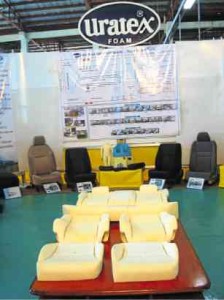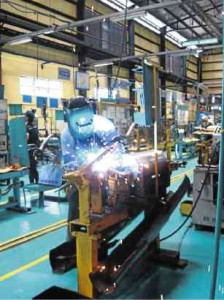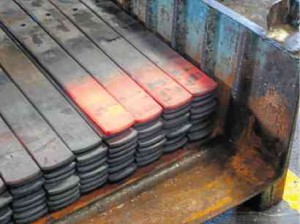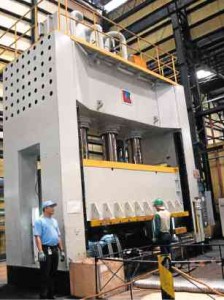RGC tends to vehicle parts soft and hard
MANILA, Philippines—Whenever Uratex is mentioned, what comes to mind are soft yet durable things on which to lie—pillows and mattresses, mostly. Uratex is but one of the many companies belonging to Robert Cheng’s RGC Group of Companies.
A pioneer in the manufacturing industry, Cheng established Uratex in 1968. The company later became one of the leading polyurethane foam manufacturers in Southeast Asia.
That’s not all.
After exploring part of a 10-hectare compound in Cabuyao, Laguna, the diversity and extent of the RGC Group came to reveal itself. From manufacturing foam products under the Uratex label, the RGC Group has diversified into plastics, textiles, automotive and industrial parts.
Call to assemble
In 1975, then President Ferdinand Marcos called on the manufacturing industry to come out with a vehicle to be assembled in the Philippines. One of the few who answered the call was Cheng. He established Roberts Automotive and Industrial Parts Manufacturing Corp. (AIPMC).
Today, Roberts AIPMC has grown so big that it now employs over a thousand men and women working in five factories. In addition, each factory is equipped with state-of-the-art technology from Japan, Germany and Italy.
Over the years, Roberts AIPMC slowly expanded the line of vehicle parts it manufactures.
In 1993, it created its own brand of radiator called Evercool. Evercool is touted to have higher cooling efficiency with more water tubes and cooling fins. Each radiator undergoes a series of rigid tests before it passes quality control.
From radiators to mufflers
Among Evercool’s growing clientele is Mitsubishi Motors Phils. Corp., Honda Group, Toyota Motor Phils., Isuzu Philippines, Nissan Motor Philippines, Columbian Motors, Pilipinas Hino, Universal Motors Corp. and Norkis Yamaha.
Evercool has a factory area of 1,300 square meters and has the capacity to produce 13,000 units a month. It has 250 models of radiators, ranging from computer radiators to power plant radiators.
The factory also heeds the call for environment-friendly processes. The radiator’s painting section has a waterfall-like structure where water pushes the paint down while the fumes go up into an exhaust pipe. Later, the water will undergo a filtering process before it is released into Laguna de Bay.
Later, Roberts AIPMC went into mufflers and exhaust systems. In collaboration with Futaba Sangyo of Japan, the company’s exhaust system plant is certified to have world-class manufacturing and quality control processes.
Put up in 1997, the exhaust system factory sits on a 5,000-square-meter lot. It utilizes a computerized production line programmed to adapt to various client specifications.
Every month, the plant produces 7,400 units and uses imported raw materials in its manufacturing process.
Japan
The country’s manufacturing sector is highly dependent on exported raw materials particularly those from Japan.
After a string of catastrophes struck Japan in March, giant automakers such as Mitsubishi and Toyota had to reduce their monthly production of raw materials by half.
“We have no option but to adjust to what we are going to receive from our suppliers. Kung ano lang muna ang requirement, ayun muna ang ide-deliver namin (Whatever the requirement is, that will be the only thing we will deliver),” says Eddie Gallor, executive vice president of RGC group of companies.
Peachy Medina, managing director for RGC group of companies, admits that they are affected by the slowdown in business.
But the group will not consider cutting back on manpower, Medina stresses.
“I’d rather see my employees clean machines for eight hours rather than remove them from their jobs,” she said.
Medina is the eldest daughter of Cheng, who passed away in 2004.
She believes there is still hope for the manufacturing industry in the Philippines.
“If you do it right, invest in technology [and create] strategic alliances, then there is room for very good manufacturers to thrive in the Philippines,” she explains.
The group is now seeking the government’s assistance to implement tighter rules on CBUs (completely built units). These vehicles are shipped into the country fully assembled.
“Before, 90 percent of cars are assembled here. But now, we’re down to 40 percent. It’s because of the CBUs,” says Gallor. “We’re just asking [the government] to level the playing field.”
Cushy
From providing foams for pillows and mattresses, Robert Cheng also ventured into developing vehicle interior parts such as car seats, cushions, motorcycle saddles, integral skin for armrests and headrests, and fully upholstered bus seats.
Cheng called this new company Multiflex RNC.
In 2009, Multiflex received much needed help from a robot, who lent not only a hand but an entire arm to increase the company’s daily output.
The Canno mixing head automatically pours chemicals needed to create and solidify foam. Two operators are needed for the robot to function, filling up 54 moulds each day.
Apart from vehicle interior parts, the group also produces mannequins for first aid and CPR training used at the Philippine Heart Center.
Tiger—a German brand that has served Europe for over 120 years—came to the Philippines in 1994. Roberts AIPMC started constructing the first parabolic leafsprings in the Philippines using the technology brought in by Tiger.
Leafsprings are key components of a vehicle’s suspension system.
The 5,200-sq.m. leafspring factory has the capacity to produce 600 tons a month.
And to finally cater to every original equipment manufacturer’s (OEM) need, Roberts AIMPC also went into the metal stamping industry.
Its 5,200-sq.m. factory has a full range of press machines from the lightest (10 tons) to the heaviest (800 tons).
It is one of two suppliers in the country equipped with an 800-ton hydraulic press. This equipment is capable of producing large auto parts such as panel roofs and bumpers.
An in-house tool and dye division—where clients are given the option to personalize tooling designs and fabrication—is also located at the factory.
The factory has the capacity to paint the town red—or any other color of the rainbow—thanks to its complete painting line that answers every client’s needs from spray painting to powder coating.



